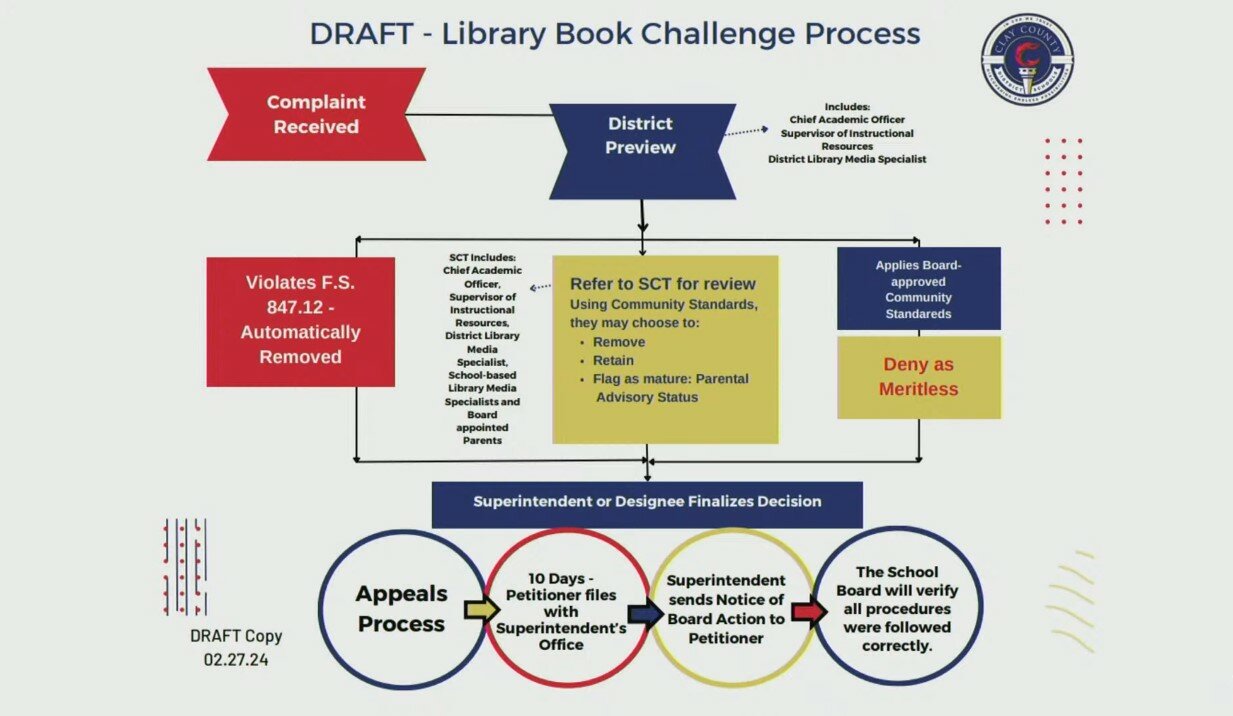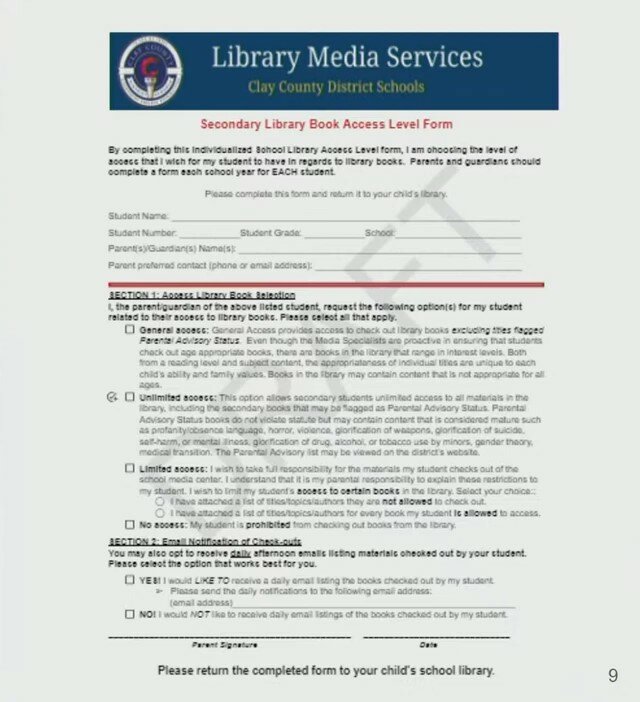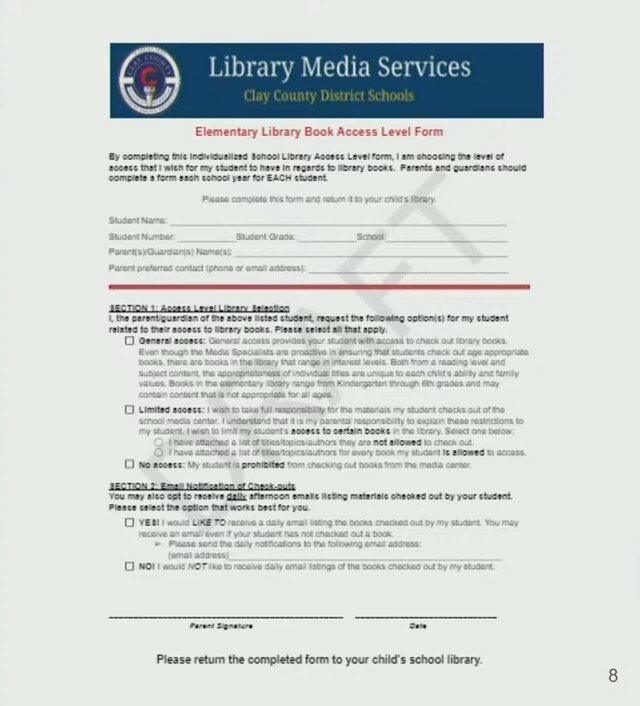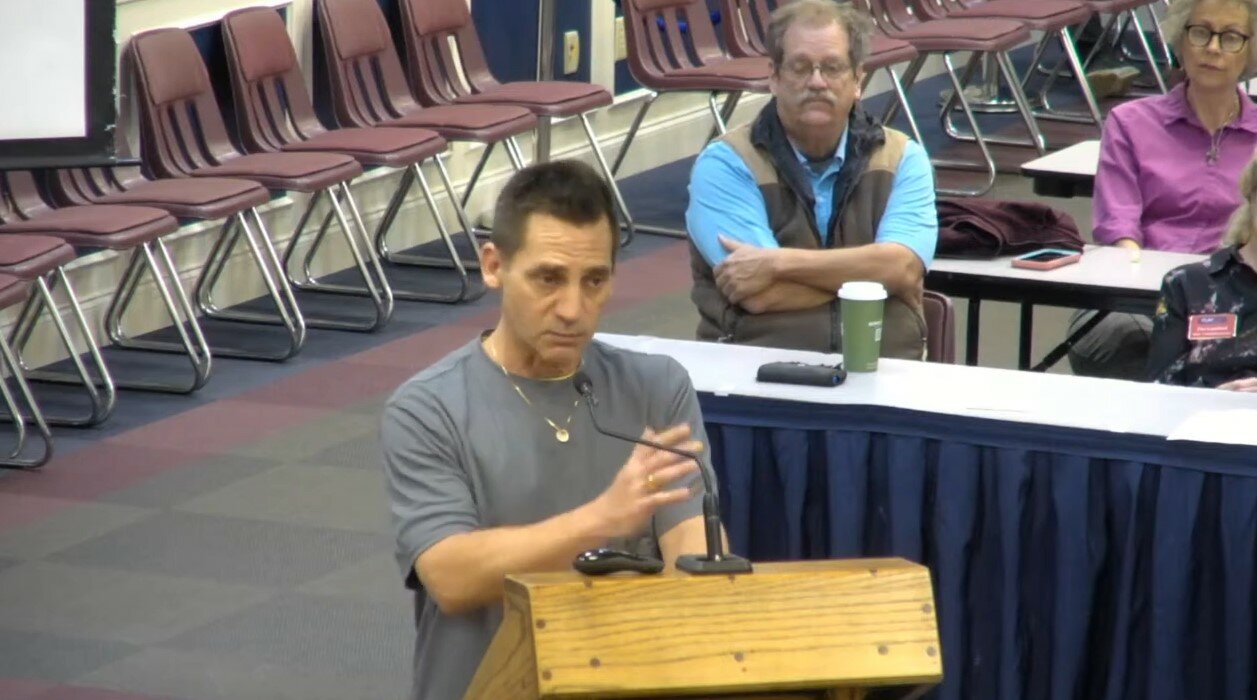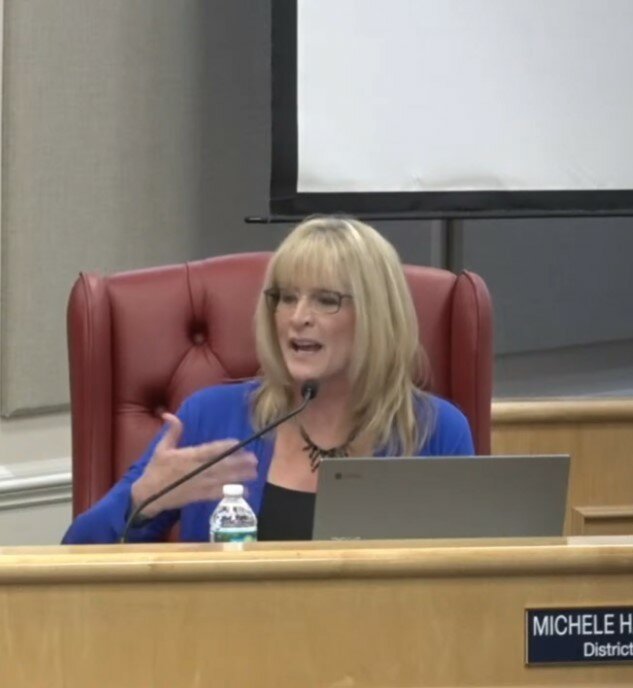Here's how public schools will be impacted by new policy to challenge books, access material
jack@claytodayonline.com
CLAY COUNTY – A school board workshop on Feb. 27 presented the newest draft of the proposed policy to challenge books in Clay County District Schools. The newest draft is the latest development in …
This item is available in full to subscribers.
Attention subscribers
To continue reading, you will need to either log in to your subscriber account, or purchase a new subscription.
If you are a current print subscriber, you can set up a free website account and connect your subscription to it by clicking here.
If you are a digital subscriber with an active, online-only subscription then you already have an account here. Just reset your password if you've not yet logged in to your account on this new site.
Otherwise, click here to view your options for subscribing.
Please log in to continueDon't have an ID?Print subscribersIf you're a print subscriber, but do not yet have an online account, click here to create one. Non-subscribersClick here to see your options for subscribing. Single day passYou also have the option of purchasing 24 hours of access, for $1.00. Click here to purchase a single day pass. |
Here's how public schools will be impacted by new policy to challenge books, access material
CLAY COUNTY – A school board workshop on Feb. 27 presented the newest draft of the proposed policy to challenge books in Clay County District Schools.
The newest draft is the latest development in the Clay County “book ban” debate, an ongoing endeavor attempting to address the 778 titles that have been challenged and the 284 titles that have been removed from public school libraries according to the district reconsideration list.
As an overview, the process for submitting challenges and accessing material is similar to the policy’s previous draft except for some notable changes.
A point of contention during the open forum was the debate between “opt-in” and “opt-out.” The current 2023-2024 school year has taken the opt-in approach – parents must first sign a permission slip for their children to access the media center. The newest proposal uses a hybrid model based on different tiers of accessibility.
- Unlimited access
- General access: students can check out books but are not flagged as “mature.”
- Limited access: parents can limit books for their students that deal with certain themes or concepts
- No access
By default, without any parental signature, the newest proposal grants students general access. Parents can “opt-in” their children for unlimited access. Additionally, parents can set specific restrictive parameters on what their children can read – limited access. Parents also have the option to “opt-out” their children from the media center entirely – no access.
The idea is to have the opt-in/opt-out form available on Synergy for the convenience of parents and media specialists.
The newest proposal appears to have moved away from decentralization, which was an idea shared in a workshop in January to answer challenges on a school-by-school basis. Decentralizing the book challenge and appeal process was criticized by media specialists PEN America and Bruce Friedman.
The newest proposal has taken a stab at framing what the district-wide community standards could look like. A detailed rubric showing examples and non-examples will be presented in the near future. Books containing any of the following would be flagged as “mature.”
- Profanity: Elementary - no crude profanity, racial, or religious slurs. Junior High - limited profanity, racial, or religious slurs. High - no pervasive use of racial slurs or crude or excessive profanity.
- Horror: pervasive gruesome behavior or feelings of extreme fear, shock, disgust
- Violence: intense morbid behavior involving physical force intended to hurt, abuse, damage, torture, kill
- Glorification of weapons – such as a nonmilitary civilian parading a gun around the street
- Glorification of suicide, self-harm, or mental illness – such as a character bragging about cutting their wrist
- Glorification of drug use – such as a minor continuously using illegal drugs
- Gender theory, medical transition
- Any other sexual content not defined by FS 847
The compromise to have a hybrid opt-in/opt-out policy was criticized by School Board Member Hanson, who has been the leader in drafting a new policy.
“To say that I am disappointed is an understatement,” Hanson said.
Hanson said the newest draft would not provide sufficient parental consent and not a sufficient acknowledgment of the 284 titles already removed from the district’s libraries, titles that were found to violate FS 847 by being pornographic.
During the school board meeting on March 7, School Board Attorney Jeremiah Blocker appeared to have cleared up that concern.
“Your policy does have informed consent and is consistent with Florida law, I want to assure you,” he said.
If approved, the policy would lift the embargo on buying new books. Newly published titles, new releases in a series, and even new, updated ACT and SAT prep books could once again be purchased if they are consistent with the approved community standards. This would finally end the book purchasing freeze in the school district that has been in place for two years.
It appears the newest draft has struck a compromise between the two sides of the debate: opt-in versus opt-out. If approved, media specialists could finally stock new books on their shelves.
“As we move forward, can we please purchase books for our children? They would really appreciate it,” said one media specialist to the school board during the workshop.
One media specialist said she was heartbroken because she had been unable to purchase books for two years.
“I don’t think I am promoting literacy anymore. I feel like I am restricting it,” she said.
School Board Member Mary Bolla was sympathetic. She thanked the public for taking the initiative and bringing their concerns to the board as the proposed new policy is being authored.
“Never be sad. Never be upset about getting emotional about learning. That’s what we’re all here for, and it’s all about the children,” Bolla said.
“I just want to offer my apology because we should have had you here for a meeting a heck of a long time ago. And I think two years is too long,” Bolla said.
The policy would significantly affect Bruce Friedman, the concerned parent who has submitted more challenges than any other resident. There were parts he commended and parts he did not.
“You are about to review and approve policy changes that include a rubric and a guideline, which is, I recall, what I asked for over a year and a half ago,” Friedman said during a school board meeting.
“The truth is out – the libraries are still filled with porn,” he said. “The (proposed) policy does not have a clear mechanism for cleaning up the mess, doesn’t have a timeline for it, and opens the gate for future purchases before the old mess is cleaned up.”
Hanson appeared to agree with Friedman.
“We have a citizen who has been reading books and doing challenges – hundreds and hundreds and hundreds of challenges – and 32 of them were pulled from the shelf last week. So, are we to say that we should not tell parents that we had 32 books, obscene, pornographic books, pulled last week? But it’s OK for your kids to go in there? It doesn’t make sense to me,” Hanson said.
One of those books was “Imaginary Friend” by Stephen Chbosky.
“We don’t have clean libraries,” Hanson said. “We had a media specialist who had a student bring a book with pornography to her. They’re going to find it. If we don’t find it, they’re going to find it.”
The next school board meeting will be April 4 at 6 p.m. The final hearing, the final decision to approve the proposed policy, will be May 2 at 6 p.m.


